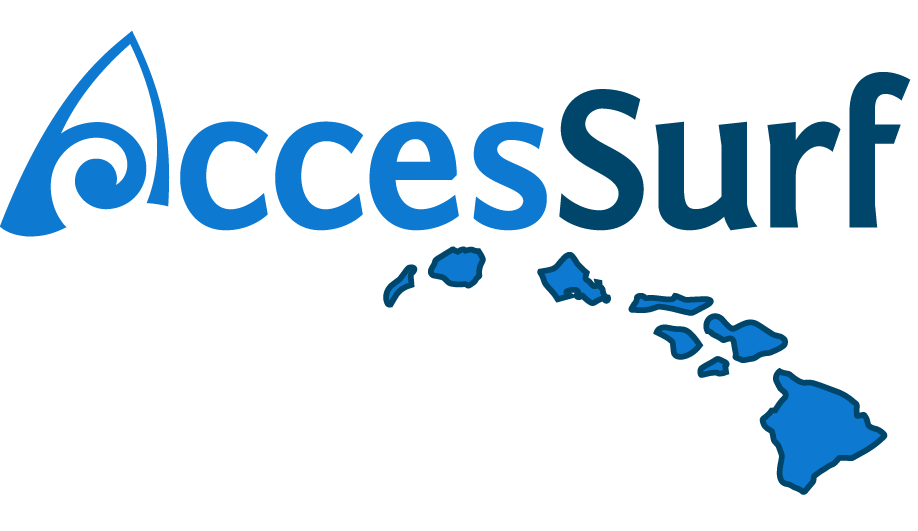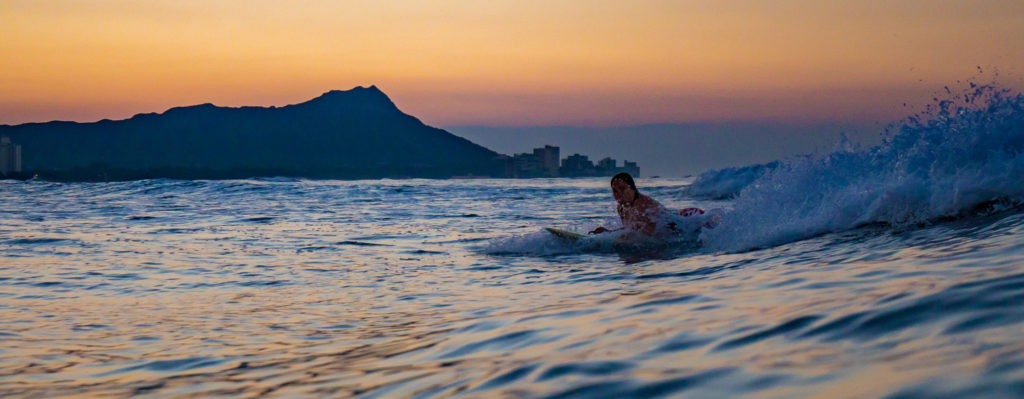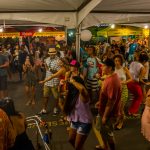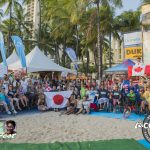“If I focus on being normal, I exclude the possibility of being extraordinary.”
Normal in my life would have been living in the confines of a wheelchair and listening to the people that told me I could not surf, get an education, create ceramics, live out of country, travel, compete as a paddler, or participate in a myriad of other adventures. My extraordinary started in the ocean pushing my abilities on a daily basis and realizing I can make my life as I choose with support, time, and equipment.
Story of my accident
In 2000, I was in an automobile accident while in college in Utah. I was the passenger and the car that hit us failed to stop before turning.
I walked out of this accident but at the hospital my aorta ruptured causing me to undergo a long surgery to repair my aorta. The lack of oxygenated rich blood left me with a spinal cord injury and a traumatic brain injury. The road to recovery was long and challenging. Those challenges made me stronger and taught me the value of accessing life to the best of my ability.
Because of my disability I have transcended into a master of problem solving, designing and strategizing on how I can live life fuller and invite my community along the way. The lesson I learned was if I focused on being normal I left out the possibility of being extraordinary.
As I am native Hawaiian, female and with a disability, the odds and statistics are against my success. Through these attributes, I was taught to be embarrassed of accomplishment and even feel ashamed of being good at something. I realized this is a common occurrence amongst Hawaiian women and people with disabilities. But what if life was without inhibition and filled with confidence, faith, love and motivation to live an extraordinary life? Realizing life can change at any moment, I believe in the power of a person’s ability to live an extraordinary life once the goal is not normalcy.
What I experience in life
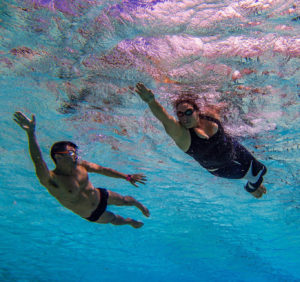 Being an athlete is not a new experience in my life. I grew up participating in many competitive sports as a gymnast, colorguard, and swimmer. I come from a long line of water women but my grandmother influenced me directly to love the water as a baby and her legacy of love for the water has lived through my veins from childhood through adulthood. As a child, my mother took me swimming at a family beach house on Kawela Bay. During my early teenage years my parents took me fishing and snorkeling along all over Oahu. When I was in high school, my friends and I discovered the thrill of surfing. As an adult, my younger cousin put me on a V1 for the first time. Like others in Hawaii, water plays an integral role in my life. So much so, my nickname is Guppy out of water because I am crazy like a fish out of water but in water I am in my serene and in my element. I have no fear in the water as I feel a freedom from all inhibitions.
Being an athlete is not a new experience in my life. I grew up participating in many competitive sports as a gymnast, colorguard, and swimmer. I come from a long line of water women but my grandmother influenced me directly to love the water as a baby and her legacy of love for the water has lived through my veins from childhood through adulthood. As a child, my mother took me swimming at a family beach house on Kawela Bay. During my early teenage years my parents took me fishing and snorkeling along all over Oahu. When I was in high school, my friends and I discovered the thrill of surfing. As an adult, my younger cousin put me on a V1 for the first time. Like others in Hawaii, water plays an integral role in my life. So much so, my nickname is Guppy out of water because I am crazy like a fish out of water but in water I am in my serene and in my element. I have no fear in the water as I feel a freedom from all inhibitions.
Going through rehabilitation, I learned everything again for the second time. Independence was taught and I was consumed with doing things on my own. Through my graduate work and my doctorate in occupational therapy, I have realized the people on the top of their fields don’t accomplish greatness alone rather, they are surrounded by a select community that supports and at times carries them. They are in a world of interdependence.
What inspires me?
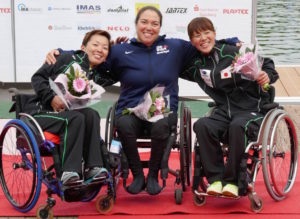 The most poignant inspiration in my life is the influence of my family, past and present. I come from a long line of water women and I know each one of them have passed their talents to me. I find strength in understanding that my accomplishments are not only from me but cultivated in my blood through many lines.
The most poignant inspiration in my life is the influence of my family, past and present. I come from a long line of water women and I know each one of them have passed their talents to me. I find strength in understanding that my accomplishments are not only from me but cultivated in my blood through many lines.
I am also inspired by sharing my gifts with others. I try to provide the support that helps a person to utilize their specific gifts and talents. Afterwhich, I watch a person with or without a disability uninhibited while spending their time doing things that define their best self.
I believe that everything is possible with enough time, support, and equipment.
How has my inspiration influenced my goals?
The fact is that I believe in life balance so my life consists of many facets, including paddling, education, spirituality, community participation, service, recreation, vocation, love, competition, work, and rest. Activities in these areas help me to live a quality life that benefits my health and wellbeing. My inspiration motivates me to strive for excellence in all these areas without feeling sorry for my circumstance but being grateful for my talents and gifts. My journey is not one I take alone but is supported by many others, as I support too. This is the essence of interdependence.
What role has AccesSurf played in my journey?
AccesSurf has enormous meaning in my life. It would be an understatement to say that I picked a single sport because of the organization, as there is so much more to the transformative process that began way back in 2005 and continues to this day. AccesSurf offers invaluable support; not only is access provided through the steep, soft, sandy beaches that are unique to the Hawaiian healing ocean, but also a platform is made available for me to give back to the community.
As one of the founding athletes of AccesSurf, I have experienced the transformation that occurs when finding a sport that resonates with my soul as I went out in the ocean for the first time and as I continue to get out in the ocean today; there I feel the perfect healing vibration of equality. As a Hawaiian, the ocean is a huge part of life and after an injury to my aorta left me paralyzed, I was always looking for ways to get back in the ocean. Accessurf came at a time when I was ready to be passionate about a cause worthy of becoming my life’s work. The journey of participating in adaptive surfing from it’s infancy has been enormously satisfying: to see the growth that has occurred, and the fact that the ISA now recognizes it as a sport worthy of official competition. In the early days, a few of the athletes would enter exhibition heats or random contests that were willing to accept our entries so we could prove that adaptive surfing was not only possible but worthy of notice. Of course, entry was dependent on if I could use key negotiation skills to convince the organizers that we could be safe in the ocean. I probably honed my keen negotiation skills, and a little of my stubbornness, from these grassroots days.
One remarkable aspect of surfing is that once in the water, people don’t treat me different in the lineup in the North, South, East or West shores. It is not until getting out or in the water that anyone actually realizes I am paralyzed and use a wheelchair. To feel for a moment the privilege of equality, is a rare experience for a person with a visible disability and one that builds a person’s confidence and moral to live an extraordinary life.
Likewise, paddling has been a huge part of my life. Competition in paddling would not have been possible without my ties to AccesSurf; Richard Julian and John Greer asked me to be on the Pure Light racing team because of my association with the organization. It was then, I was lucky again and was encouraged to also participate in V-1 paddling. The Va’a represents more than just a competitive sport, but rather a cultural experience that took me on a journey across the world learning cultural connections to outrigger, Va’a, and voyaging pursuits. Five years later, I have paddled throughout the world, yet I still have many lessons to learn as I carve a path in the world of ocean/water sports.
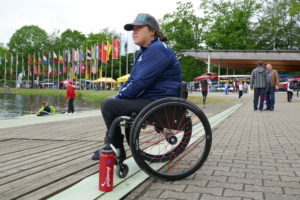 But water is more than a place to relax, exercise, or compete; I like to think of water as a vein that connects me to my home. Water is neither made or destroyed but is recycled by a continuous circular process of evaporation and falling rain. I like to think of this as wherever I am in the world–knowing that the water I am in could very well be water from my home waters in the islands. So both water and the Va’a connects me to my home wherever I may be in the world.
But water is more than a place to relax, exercise, or compete; I like to think of water as a vein that connects me to my home. Water is neither made or destroyed but is recycled by a continuous circular process of evaporation and falling rain. I like to think of this as wherever I am in the world–knowing that the water I am in could very well be water from my home waters in the islands. So both water and the Va’a connects me to my home wherever I may be in the world.
And, as research has confirmed, people with disabilities prefer water and natural environments in which to recreate, yet these environments are the very places that are not accessible to all. AccesSurf has spent a decade providing easy access to the water, and will continue to do so, including through dedicated volunteers that provide physical help to get into the water, the use of adaptive equipment, legislation and policy changes, education, and so, so much more. I benefit from this dedication, as the current VL1 World Champion and KL1 first alternate for the 2016 Paralympics, I have come to AccesSurf over the course of my career by using the adaptive equipment to support my training, by asking for support of volunteers to help me drop my boat in the water, paddle with me, assist my participation in races, by seeking sponsorship, and so much more that is unmeasurable at this point. This organization continues to support me and many others in their life’s work.
Now that I am developing my education and career as an Occupational Therapist and athlete, the beauty of AccesSurf is that it provides a platform to allow me to give back and utilizes my talents to grow and benefit so the circle of support is solidified, exemplified and expanded. Stay tuned, as one of the projects that is stewing is the possibility of creating a place for paddling in the growing services and programs that are provided.
This experience has be a ride of a lifetime and I am so lucky to be part of the AccesSurf ohana (family).
